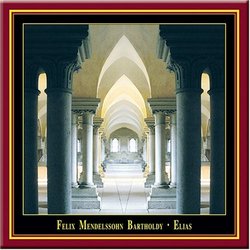| All Artists: Felix Mendelssohn, Juergen Budday, SWR Symphony-Orchestra, Maulbronn Monastery Edition, Kantorei Maulbronn, Peter Lika, Heidi Elisabeth Meier, Jolantha Michalska-Taliaferro, Hans Peter Blochwitz Title: Felix Mendelssohn Bartholdy: Oratorio Elijah Members Wishing: 0 Total Copies: 0 Label: K&K Verlagsanstalt Release Date: 1/13/2004 Genre: Classical Styles: Opera & Classical Vocal, Symphonies Number of Discs: 2 SwapaCD Credits: 2 UPC: 803680324622 |
Search - Felix Mendelssohn, Juergen Budday, SWR Symphony-Orchestra :: Felix Mendelssohn Bartholdy: Oratorio Elijah
 | Felix Mendelssohn, Juergen Budday, SWR Symphony-Orchestra Felix Mendelssohn Bartholdy: Oratorio Elijah Genre: Classical
A concert-recording from the minster at abbey Maulbronn performed by Peter Lika (bass, Elijah), Heidi Elisabeth Meier, Jolantha Michalska-Taliaferro, Hans Peter Blochwitz, The Kantorei Maulbronn and members of the SWR-symp... more » |
Larger Image |
CD Details
Synopsis
Album Description
A concert-recording from the minster at abbey Maulbronn performed by Peter Lika (bass, Elijah), Heidi Elisabeth Meier, Jolantha Michalska-Taliaferro, Hans Peter Blochwitz, The Kantorei Maulbronn and members of the SWR-symphony-orchestra. Conductor: Juergen Budday. Mendelssohn?s Elijah, one of the most important oratorios of the nineteenth century, premiered in Birmingham in 1846 and was emphatically celebrated both by the public and the press. According to a contemporary review, Mendelssohn turned music "into a grand sacred service". Elijah is a biblical figure, and consequently the libretto is composed entirely from biblical texts. The oratorio lacks a continuous plot. Rather, important excerpts from the life of the prophet are strung together like snapshots, some of which are highly dramatic. The prophet?s ascension into heaven concludes a series of powerful, dramatic and pathetic circumstances, effectively depicted by Mendelssohn music. The oratorio ends both with a somewhat mystical reference to the Messiah as the figure who truly consummates faith and the divine work, as well as a vision of divine grandeur. Despite the lack of a continuous plot, Mendelssohn manages to create gripping, dramatic episodes. The chorus plays a special! , important role. It sustains the action over long segments, taking the part of the people or of Baal?s priests; elsewhere, it slips into the role of the community of the faithful ("Blessed is he who fears the Lord" or "He who persists until the end") and comments on the events. Mendelssohn, with the help of the minister Julius Schubring, essentially took the entire text from 1 Kings 17-19 and 2 Kings 1-2. Mendelssohn wrote Schubring on 2 November 1838, with regard to the character Elijah: "For Elijah I had in mind a proper prophet through and through, of the sort we could use again today: strong, zealous, as well as angry, furious and grim, in opposition to the rabble of the court and of the people, in opposition to nearly the whole world, and yet borne as if by angels? wings." Seen in this way, the prophet Elijah, and hence Mendelssohn?s oratorio, is once again extremely relevant for us today.

 Track Listings (22) - Disc #1
Track Listings (22) - Disc #1